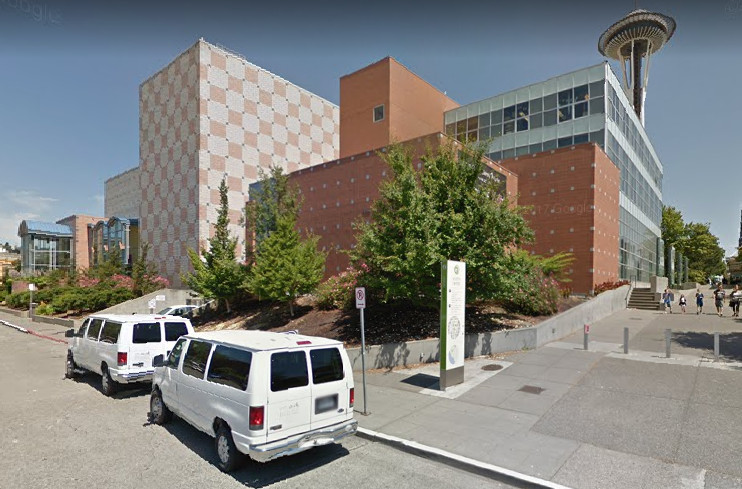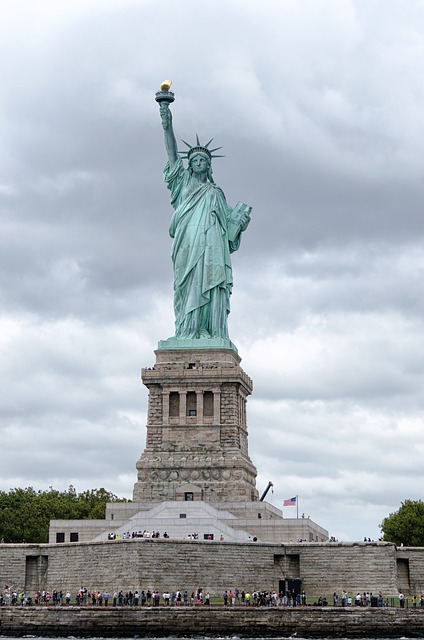My Story: Liberal, Academic Environmentalist --> Voluntaryist, Part I
My struggle against old beliefs was long and painful. I found it difficult to reconcile my new perspective with my existing set of beliefs even though I had extreme confidence in the accuracy of my new perspective. I hope these stories help people to understand what other people experience when you ask them to consider the seemingly obvious path of not harming peaceful people.

The Space Needle in Seattle Center, as seen from the Olympic Sculpture Park
Discarding a Belief Held by Many Environmentalists
My story begins at Seattle Center. I would walk around Seattle Center during my lunch hour, and one of my favorite areas was a field with sycamore trees (or Arizona Plaintrees to be more precise). I had previously lived at the base of Tiger Mountain where I would frequently enjoy long hikes in the woods. I enjoyed being in nature.

A sycamore tree, from Wikipedia
I had heard about a proposal to build a children's theater in Seattle Center, but I thought that nobody would want to pay $6,000,000 for such a thing, so I didn't worry about it. One day on my lunchtime walk, I approached the back entrance to Seattle Center near the field of sycamore trees, but what I saw was a field full of tree stumps! I literally gasped. Construction for the theater had started, and they chopped down trees that were not even close to the original site of the theater (the building has since been enlarged).

Seattle Center today from Google Maps. The foreground buildings are where the trees were. This pic shows new additions to the building that happened long after the story told here
I realize that most people would not be the least bit affected by seeing a field of sycamore trees cut down, but I felt like you might feel if somebody killed your dog. It was a combination of anger, disbelief, frustration, and a sense of loss, all at the same time. I could not believe how stupid someone could be to cut down those beautiful trees--especially for something that I saw as a waste of money. One of my favorite places, has now been destroyed. I felt like society was going in a direction that would continue to crush and destroy the few remaining things that I valued.

Flash forward... I was now living in a different state and was a volunteer as part of a committee to find ways to reduce greenhouse gas emissions and conserve energy in the county were I lived. The voting members of the commission were a mix of academics, business owners, and at least one activist. I would collect information from the members, find citations and examples to elaborate, and assemble the information to create the background report for the commission. I researched the topic from the 12 viewpoints of the main members.
Through most of that period, I started with the goal of implementing whatever program was needed to attain "sustainability," and I placed absolutely no value on individual liberty. Only one of the commission members expressed any interest in individual liberty. I thought the one lady who kept talking about individual liberty was crazy, and I did not spend any time or effort considering her viewpoints. I added her contributions to the main report without any elaboration.

It was not until the end of that year that I finally started to ponder questions from the wacky Libertarian lady. Perhaps the trigger was seeing people recommending more and more extreme regulations. I finally asked myself by what means do the people on the board think they are justified in micromanaging the behavior of others?
I had never previously questioned how the state justified regulations beyond their superficial claims of "public welfare" and so forth. I think the key here is that I finally made a serious effort to understand the perspective of liberty versus the claims to power made by the state. That serious effort could not happen until after I removed my assumption that the Libertarian person who asked the question was crazy.* I now questioned the state, but I did not develop my thoughts into a broader philosophy.
Not long after the energy conservation project, I was working on my dissertation and conducting a literature review of various ways that philosophers viewed the morality of acts that affect nature (background for a psychological study). I looked back to my experience at Seattle Center and tried to identify WHY it was "wrong" to cut down those sycamore trees. By this point, I had gained an appreciation of what happens to our conclusions when we form them in the absence of evidence, so I searched for the empirical evidence to answer my question.

internal struggle, picture from pixabay
I struggled to answer my question with empirical evidence as opposed to relying on my gut feeling (where my gut feeling was simply a reflection of my subjective preference for natural environments, comparable to a subjective preference for one kind of music vs another). Maybe if I carefully examined the bark of the tree I would identify the source of the the tree's intrinsic value, then I could argue that the planet loses this intrinsic value when people cut down trees. I could not find such a thing. I know that I like trees, but I also like sitting quietly in a room, and I'm not going to force people to do that. Could I look at the roots of the tree to find intrinsic value? Could I count the rate of carbon sequestration? Maybe the intrinsic value is in the leaves.
I can measure various things related to trees, but no matter where I looked, I could not find any objective basis to support my pre-existing belief that a field of trees is "better" than a children's theater. I had no objective basis to say that it is wrong to cut down trees to build a children's theater. More specifically, I could not find adequate empirical evidence to support my belief in the intrinsic value of nature that would justify acting against otherwise peaceful people who built or supported that children's theater (assuming that it was built with voluntary funds).
After about 6 months of repeatedly visiting this question for hours at a time, I realized that I could not defend my belief in the intrinsic value of trees, so I discarded that belief. I still prefer a natural environment versus a man-made environment, but I have no basis for acting against people who cut down trees. The same logic applies to other beliefs that I had, but some of my unwarranted beliefs remained because I never took the time and effort to challenge them.

Philosophical, Psychological, and Scientific Views of This Struggle
Philosophically, a belief that you continue to endorse after you have been presented with a counterargument that you cannot overcome is sometimes called a Moorean fact. Psychologically, denying the validity of a valid counterargument might be caused by cognitive bias. Scientifically, you can not assert that something exists in the real universe without first conducting a empirical study in which all the methods are comprehensively criticized to find possible flaws. The dispositions of some philosophers who endorse Moorean facts are opposed to those of scientists who demand empirical evidence. Philosophers who endorse the Moorean fact are not arguing scientifically.
I am not aware of any law of the universe that compels people to think scientifically, but I have a subjective preference for avoiding false conclusions more than I have a subjective preference to endorse a conclusion that I WISH to be true. I prefer to stay away from dreamland, but I might pursue research to explore something that I suspect might be true.
About This Blog and This Post
This blog will be mostly about finding ways to communicate effectively with statists so that we can reach a mutual understanding and agree to not harm peaceful people. As I suggested in this post, it is easy for an otherwise intelligent person to be completely unaware of the adverse effects of policies that we support. Have some patience when you talk with statists! It takes time!
Please resteem! There is more content coming, so follow me! https://steemit.com/@cnacws.
thx